Make it yours
Every experience is customised to be just right for you.
WILDLIFE VOLUNTEERING: THE RED FLAGS MOST PEOPLE MISS
Learn more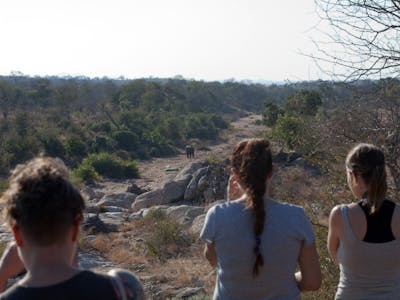
This immersive school biology field trip introduces students to the constantly evolving world of practical ecological fieldwork. Working in some of Africa’s most important and remote intact ecosystems, students will gain a strong foundation in the latest wildlife research technology and techniques for data collection.
With exclusive access to a dedicated research station and the support of experienced conservation professionals, students will learn to track, monitor and study an extraordinary range of iconic African species, from lions to elephants. They’ll formulate research questions, apply the scientific method, and gain hands-on experience in conducting real-world research - all tailored to support A-level, IB or AP biology curricula and internal assessments.
Beyond the fieldwork, this trip offers unique behind-the-scenes insight into one of South Africa’s largest wildlife rehabilitation centres and the opportunity to explore the bush after dark, giving students an even deeper connection to Africa’s unforgettable wildlife. With every activity building knowledge, skills and confidence, this is biology brought to life.

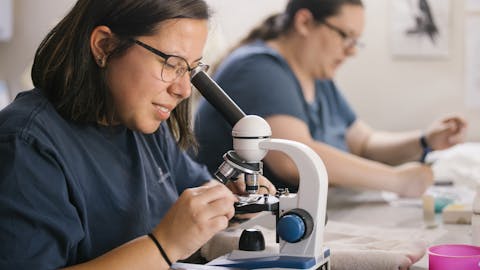
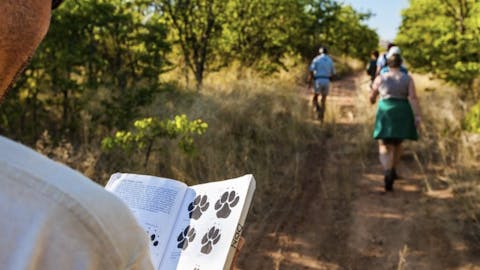
With the African wilderness as your classroom, students will experience life in some of the continent’s leading conservation projects and explore one of the largest conservation areas on Earth.
Throughout the trip, students will work alongside experienced conservationists in the field and learn to collect data using the latest research technology. They will also have time to explore the ethical questions that professional conservationists grapple with daily.
Monitoring and researching animal populations and their environments is a vital part of wildlife conservation. Whether students are using camera traps or transects to monitor species, they will discover real and relevant methods of wildlife research - and contribute to the future of endangered African species.
This field trip is ideal for biology, zoology, conservation studies and wildlife management students. Because every group has a unique curriculum and educational approach, we cater for a wide variety of learning outcomes - we can even provide learning resources to help students prepare for their field trip.
Students will have the opportunity to carry out independent research projects in one of the most important conservation areas in Africa. From developing their own research question to collecting real-world data, they can produce new and relevant scientific projects.
Students will stay at a private research camp in the African bush and take part in a project within the world-renowned Greater Kruger National Park - one of Africa’s most biodiverse and ecologically important regions. Contributing to research initiatives that support the protection of iconic species, such as critically endangered African wild dogs, students will gain insight into the challenges of preserving large, connected ecosystems and their importance to conservation.
This is a suggested itinerary. Every field trip can be customised to be just right for you and your group.
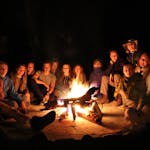
Welcome to your off-grid base camp, deep in the Greater Kruger National Park - home to the Big 5 plus hippo, giraffe and wild dog among others. Your group will have exclusive use of the camp with accommodation in safari tents with comfortable beds. Throughout your stay, students will help prepare meals, wash dishes, and keep the camp clean and running smoothly - a great way to learn important life skills. Evenings are usually spent around a crackling fire, soaking in the sounds of the bush at night.
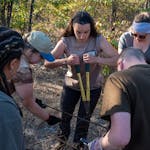
Removing invasive plant species is vital for protecting biodiversity, as they can outcompete native plants and disrupt natural processes. By eliminating invasives, students will help restore and improve habitats for native species, and ensure the overall health of the ecosystem. Clearing out old fencing material is just as important, as this can be used by poachers to create snares or entangle wildlife leading to injury or death. By extracting this material students will actively save the lives of African wildlife.
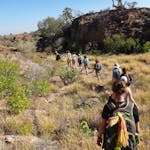
Head into the bush on foot and gain insight into how wildlife is effectively protected and monitored on the ground. While on the walk, students will help look for snares and other signs of poaching activity. (Don’t worry, this is a safe activity focused on learning not encountering poachers!) Students will also learn how to recognise and identify different African animal species and their tracks out in the wild - vital skills in any game ranger’s toolbox.
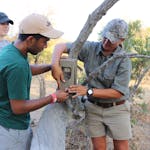
Assist the rangers in setting up camera traps to carry out real-time monitoring of wildlife. Head out on game drives to learn how to use digital and hard-copy maps to apply sampling techniques and record species’ presence. And practice real-world scientific data collection skills while observing a diverse range of species at a watering hole.
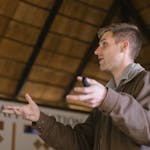
Throughout this field trip, students will engage in talks and debates about important conservation topics. From the ecology of the Greater Kruger area and how it connects with protected ecosystems in Zimbabwe and Mozambique, to ethical questions around elephant overpopulation and whether hunting still has a place in modern-day conservation.
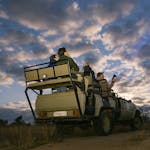
Embark on a thrilling night drive to search for nocturnal species such as bushbabies, leopards and hyenas. Learn how to use a spotlight to find these species while ensuring no negative impact on the animals. Then enjoy an astronomy lesson under the vast African sky where students will learn to identify constellations visible in the southern hemisphere.
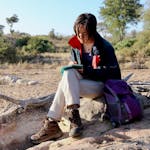
Students can undertake their own research projects to get a feel for every step of the scientific process, from planning their study, collecting data, to presenting their findings to their peers. The location presents a multitude of possible research topics. Some recent examples include the degrees to which elephants strip bark from different trees, how vegetation density affects wildlife distribution, and the correlation between wind speed and the size of impala herds.
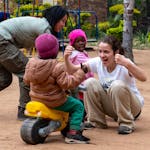
Spend the morning at a local NGO which offers a crèche to support children while their parents work on nearby farms. Students will get to help in the food garden, assist with the upkeep of the centre, and support educational playtime with the children. The time they spend at the creche is an opportunity for everyone to learn more about different cultures and engage in meaningful exchange.
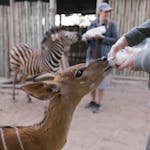
Take a behind-the-scenes tour at one of Africa's largest wildlife rehabilitation centres. The experienced team at Moholoholo will introduce students to their resident birds of prey, big cats, honey badgers, bushbabies, hippos and other species - and explain the vital role animal care and rehabilitation plays in wildlife conservation. Returning to camp in the evening, they will have a fireside debate about the pros and cons of wildlife sanctuaries.
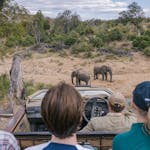
Exploring the public areas of the National Park in open-sided safari vehicles with expert guides, students will have an incredible opportunity to see some of Africa’s most iconic wildlife up close. This excursion offers students the chance to encounter wildlife species they haven’t yet seen, deepen their understanding of the national park’s rich biodiversity, as well as learning about public and private land management in African conservation.
Understand and practice the various scientific methods of data collection used to monitor wildlife in the African bush - and the practical applications of each approach.
Understand how data is used to maximise conservation success through strategies for habitat protection and wildlife population management.
Apply theoretical knowledge of ecosystem functions, biodiversity, and trophic relationships gained in the classroom to real-world examples in the African bush - observing first-hand how changes in predator, prey or plant populations impact the entire ecosystem.
Gain a deeper understanding of habitat loss, poaching and the illegal wildlife trade, the decline of endangered species, and other globally significant conservation challenges.
Explore the trade-offs between habitat protection and human land-use needs in a modern African context. Examine both sides of complex ethical debates, such as rhino horn trimming, ownership of wild animals, and the role of trophy hunting in conservation.
Learn about the behaviour of animal groups, the movement of herd species, as well as the hunting and breeding behaviour of predators.
Related field trips
Explore programs similar to this one.
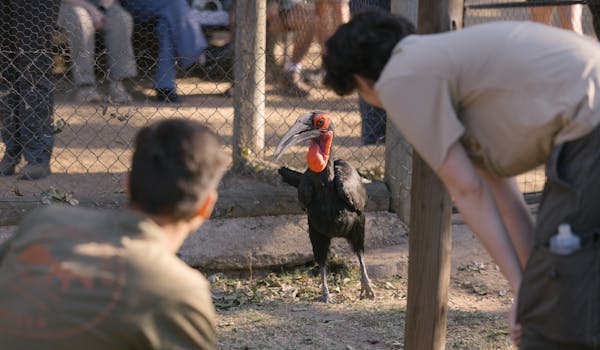
Gain experience working in an animal care centre and supporting conservation field work
View details for Kruger Animal Care & Conservation Trip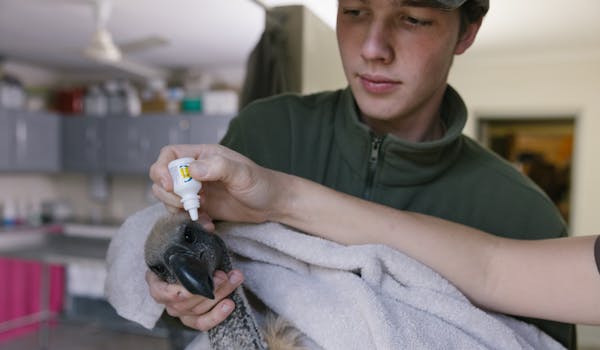
Expand your students’ experience by supporting real wildlife vets in the field
View details for Veterinary Medicine In Conservation Field Trip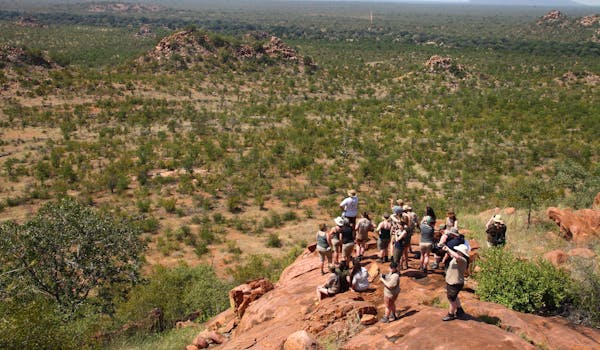
Challenge your students by joining internationally relevant conservation projects
View details for Global Citizens CAS Field Trip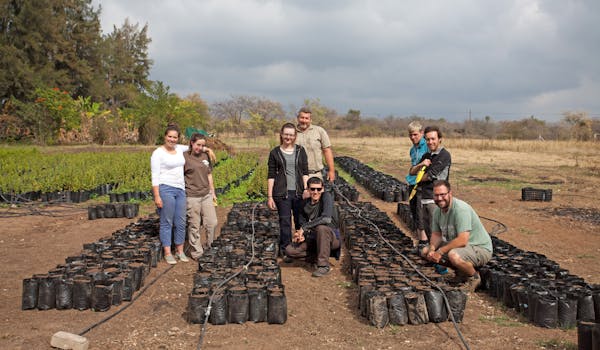
Work hands-on to support conservation projects alongside local communities
View details for Changemakers Service Learning Trip